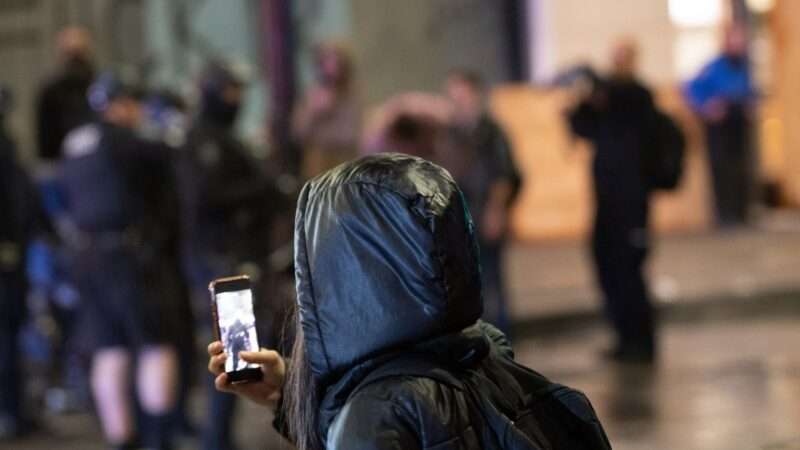
A federal judge on Friday permanently banned Arizona from enforcing a new law restricting how closely people may film police, finding that the law violates a core First Amendment right to record law enforcement officers.
U.S. District Judge for the District of Arizona John J. Tuchi wrote that the law, which made it a misdemeanor offense to film a police officer within 8 feet after receiving a verbal warning, “prohibits or chills a substantial amount of First Amendment protected activity and is unnecessary to prevent interference with police officers given other Arizona laws in effect.”
The ruling is no surprise; Tuchi had already issued a temporary injunction last year suspending enforcement of the law in response to a lawsuit filed by the American Civil Liberties Union of Arizona and multiple media organizations. And supporters of the law could find no one to defend it on its merits in court—neither the Arizona Attorney General’s Office, Maricopa County law enforcement, nor the state Legislature that passed the law.
The law, passed last year, made it a misdemeanor offense to continue filming police activity from within 8 feet of an officer after receiving a verbal warning. There were exceptions for filming the police in a private residence, during a traffic stop, and if the person filming was the subject of the police encounter. But the law qualified those exceptions, saying they applied only if the person recording is “not interfering with lawful police actions” or “unless a law enforcement officer determines that the person is interfering in the law enforcement activity or that it is not safe to be in the area and orders the person to leave the area.”
The bill’s sponsor, state Rep. John Kavanagh (R–Fountain Hills), wrote in a USA Today op-ed that he introduced it “because there are groups hostile to the police that follow them around to videotape police incidents, and they get dangerously close to potentially violent encounters.”
There were several similar bills restricting the ability to film the police introduced in statehouses in the South Carolina and Florida legislatures as backlash to the George Floyd protests of 2020.
Civil liberties groups and media outlets opposed the legislation as soon as it was introduced, arguing it was overly broad, vague, and would chill the free speech rights of citizens and reporters.
The right to film the police has been upheld by multiple federal appeals courts as a fundamental First Amendment activity. Last July, the U.S. Court of Appeals for the 10th Circuit ruled that a Colorado police officer did not have qualified immunity from a lawsuit alleging that he illegally tried to stop a man from filming a DUI traffic stop. The court ruled that a reasonable officer would have known that he or she was interfering with protected First Amendment activity.
The Phoenix New Times reported that attorneys for the Arizona House and Senate warned lawmakers that there were potential constitutional issues with the law. However, the Republican-led Legislature passed it anyway, and then-Gov. Doug Ducey signed it into law.
When the lawsuit hit the docket, though, no one wanted to defend the new law. Former Republican Arizona Attorney General Mark Brnovich declined to show up, as did the Maricopa County Attorney’s Office and lawyers for the state Legislature.
The ACLU of Arizona announced earlier this month that it had reached a settlement agreement with Democratic Arizona Attorney General Kris Mayes to ban enforcement of the law and end the lawsuit.
“This settlement will ensure every Arizonan’s fundamental rights are protected and people are not criminalized exercising their First Amendment rights,” ACLU staff attorney K.M. Bell said in a press release. “Recording police officers is an important tool for holding law enforcement accountable to the public they are sworn to serve. We hope this settlement will deter the Arizona state legislature from continuing to pass flagrantly unconstitutional laws against the advice of their own attorneys.”
The post Federal Judge Strikes Down Arizona Law Limiting Ability To Record Police appeared first on Reason.com.
from Latest https://ift.tt/IHPxVjg
via IFTTT